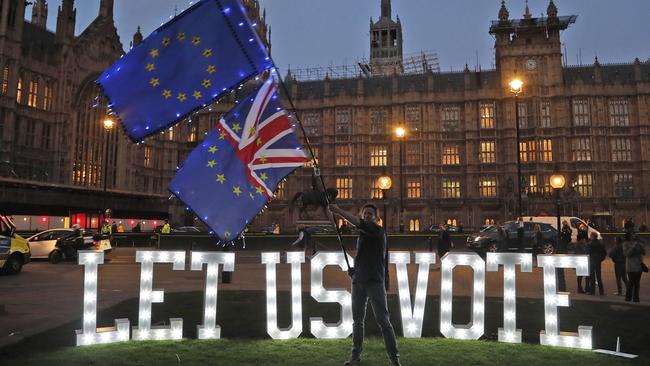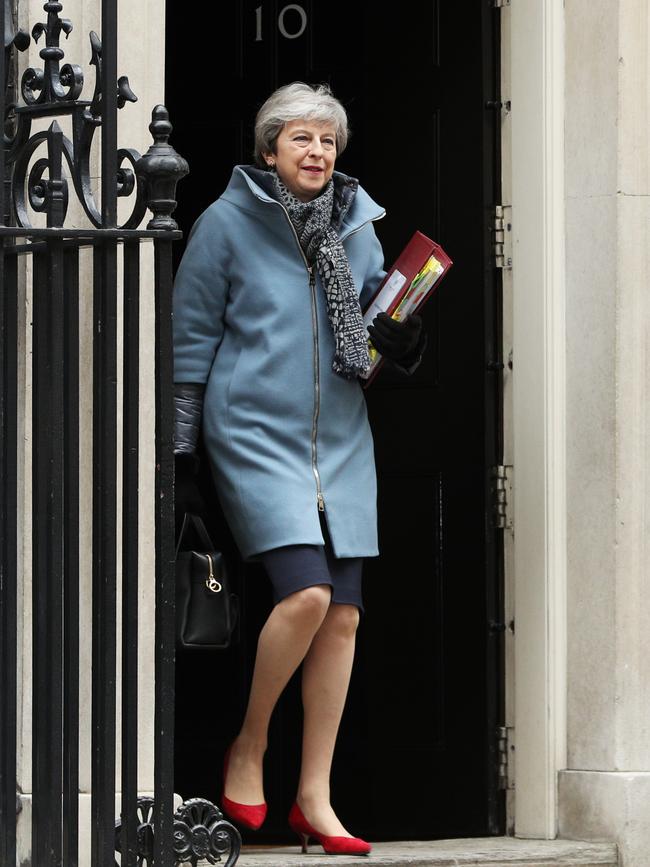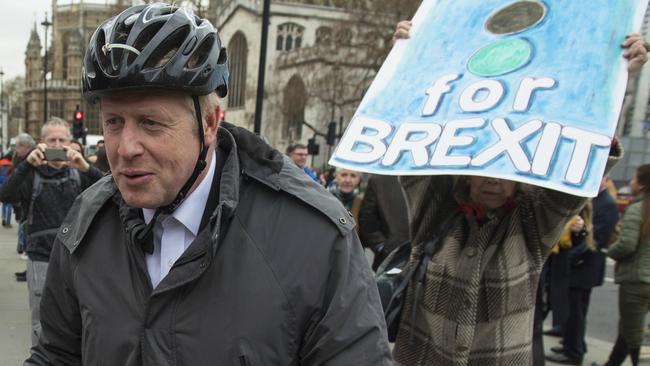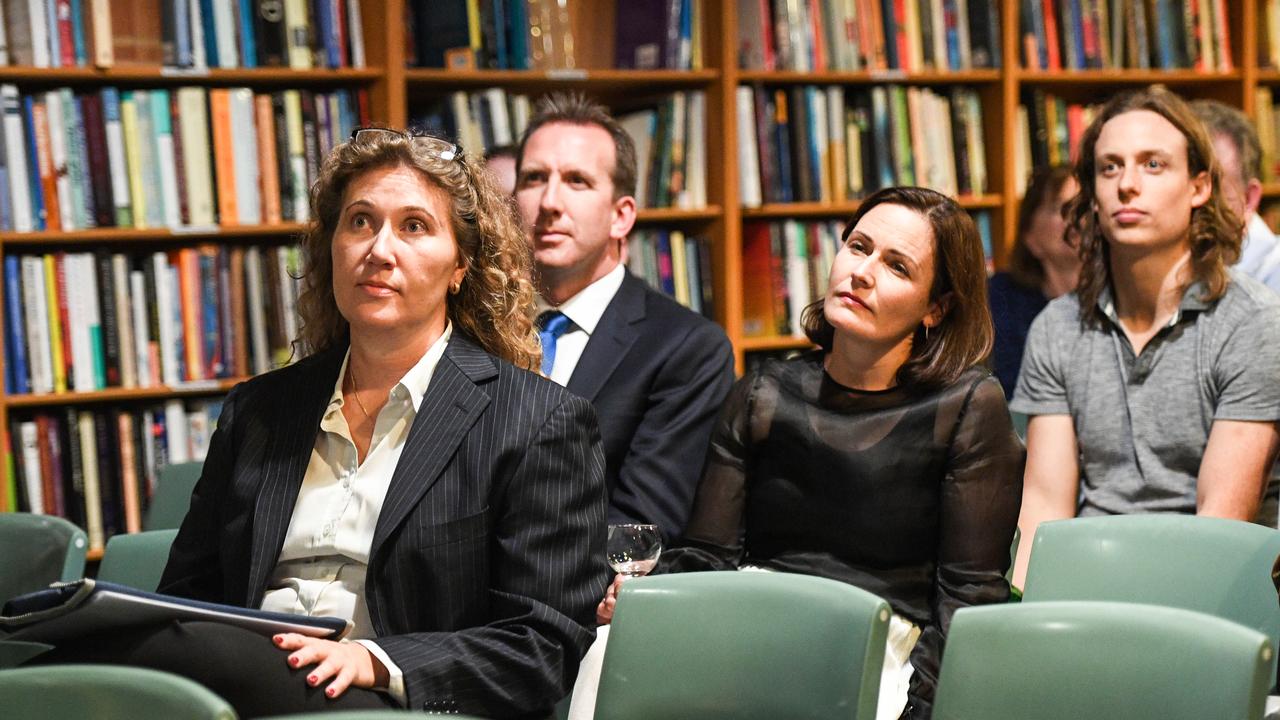UK falters on the way out
Despite Theresa May’s offer to resign, there is still no clear path to Brexit.

Look at today’s date: March 29, 2019, the day Brexit was meant to happen. The day that, according to former British foreign secretary Boris Johnson, Britons were “meant to be weaving through the moonlit lanes of Sussex, half blind with scrumpy, singing Brexit shanties at the tops of their voices and beating the hedgerows with staves”.
This was supposed to be the day Britain divorced itself from the EU. It was what European parliamentarian and former UK Independence Party leader Nigel Farage celebrated as the country’s “independence day” when the Brexit referendum result emerged in the early hours of June 24, 2016, as a 52 per cent vote to leave. And what has happened instead?
Nothing, and everything.
Johnson, whose shock at the country’s lack of confidence in going it alone matched only his disdain for Prime Minister Theresa May’s toxic withdrawal bill, described it thus: “In one of the most protoplasmic displays of invertebracy since the Precambrian epoch, this government has decided not to fulfil the mandate of the people.”
Nice turn of phrase, but 25 words when just one would do: spineless.
May sacrifices herself

That was on Wednesday night (AEDT). Hours later it became clear the only departure of the week was going to be the Prime Minister, who yesterday promised to sacrifice her political future for scores of votes to swing behind her withdrawal agreement.
As is the way with anything to do with Brexit, the fast-moving developments had shifted a range of the spaghetti graph of outcomes, even enmeshing Johnson. From hating her deal and resigning from the cabinet because of it, he is now going to tolerate it, or at least vote for it. The difference? May’s promise to resign if the withdrawal agreement is passed on its third attempt.
That was compounded with a very real fear that Remainer backbenchers, who had the numbers in parliament to introduce a series of historic but non-binding indicative votes, could then force through a softer Brexit or have it cancelled altogether, regardless of the government’s wishes.
“What an undignified way to end your premiership,” said Liberal Democrat leader Vince Cable.
The insanity of Brexit means May, if successful in forcing through her withdrawal agreement, has to give up her job. And Johnson will be a leading contender to take her spot. But if it fails, or it is not voted on, then she gets to stay on as Prime Minister.
May, a Remainer who says it’s her duty to deliver Brexit, promised more than 100 times that the country would leave the EU on March 29, but that hasn’t happened. At best it could happen on May 22. But if there is no viable option agreed with the EU by April 11, then it appears that the Westminster backbench revolt will force a cancellation of Brexit altogether before any no-deal Brexit occurs. The confusion continues.
During the past nine months May has overseen a chaotic and unpredictable Conservative Party, a parliament that is in open rebellion and a public that is furious at the self-serving politicking and indecision of its elected MPs amid record-breaking government losses, humiliation and disregard for centuries-old parliamentary conventions. These are dramatically shifting political tectonic plates that will change British politics for generations.
Tonight, instead of Brexit day, May may try for the third time to get the House of Commons to approve her withdrawal agreement — and if she is allowed to table it, the result will be close.
During the past few months she has turned around a staggering, history-making loss, by 230 votes, and it could come down to a dozen or so votes — although the maths became more difficult yesterday when the Democratic Unionist Party, whose 10 votes the Conservative government relies on for a parliamentary majority, refused to back May’s deal.
If the deal passes, the country will leave the EU on May 22. If it doesn’t, the stresses of the decision-making process — which already have led to pressure for some bizarre, unattainable outcomes amid the fiercest accusations of treachery, treason and opportunism — could prompt a no-confidence motion in the government and a general election.
How has it all come to this?
PM lost control
During the past few months May has lost more and more control. A trickle of ministers, a resignation here and there, has evolved into full-blown rebellion, with mortifying open calls for her resignation and unusual defiance of the whips as scores of Tory MPs crossed the floor. Backbench MPs wrested control of the Commons timetable this week for the first time in 140 years, holding indicative votes and seeking further debate to narrow down their preferred options.

Johnson now feels there is a palpable risk of losing Brexit altogether. He thinks that with the chance of a leadership change in the next phase, Brexiteers have little choice but to vote for the withdrawal agreement. Only 26 per cent of the public agrees with him, and 42 per cent of the people do not support May’s deal.
May has had to offer her own head in return for Johnson and scores of other reluctant MPs agreeing to help her push the withdrawal agreement over line on any third attempt, but the offer may turn out to have been premature if she doesn’t have the numbers, or if the Speaker refuses to allow her to table the deal again.
In reality, it is just the latest disaster in a series of miscalculated judgments. It was May who decided to have a snap general election in June 2017 to increase her majority. She had completely misread of the anger of Remainers and was left with a hung parliament, with the Tories able to rule only with DUP support.
Then, inexplicably, instead of an experienced negotiator, she appointed Olly Robbins, a civil servant who in his Oxford University days was well known as a European federalist, to head the Brexit talks with the EU.
A succession of Brexit secretaries were sidelined, unable to break through the tight inner sanctum of May and her consigliere, who insisted such deal-making had to be kept private for tactical reasons.
By then the EU, seeking to punish Britain for leaving so that other European countries would not be tempted to do follow suit, was demanding that Brexit must involve a stage-by-stage process, and insisting on a withdrawal bill before any future relationship could be discussed. This was always going to be to Britain’s detriment.
Bordering on insanity
Incredibly, the detested Irish “backstop” — designed to keep the Irish border open for trade — was one of May’s own making. It was her idea — despite the DUP clearly warning her of the political consequences. The DUP has stuck to its principles and refused to back anything that threatens to break up the UK.
For the past two years, ever since parliament, including the Labour opposition, voted in 2017 to start the countdown to Brexit, the discussion has really only been about a handful of issues: securing the rights of EU citizens living in Britain and those of Britons living in the EU; the size of the divorce bill, still unknown but believed to be about £39 billion ($72bn); and the contentious sticking point, the Irish border.
The really significant issue, that of the future trading relationship with the EU, was described in the vaguest terms in a short document and has yet to be decided.
Late last year the EU and May’s team reached agreement on the withdrawal deal, which included several eyebrow-raising points, but most dramatically gave the EU a means by which to “trap” the UK in the customs union, because there would be no obvious way to get past the Irish border conundrum.
Gina Miller, who initiated a High Court legal battle to ensure that parliament had the right to vote on May’s withdrawal deal with the EU, knew that parliament is overwhelmingly Remain focused, as is the Speaker of the house, John Bercow. She is a fierce Remainer and has been calling for a second referendum, or people’s vote, to confirm any parliamentary decision.
As May’s grip has faltered, the flamboyant Bercow has become increasingly influential. Referring to a 400-year-old tradition, he said any move to retable May’s withdrawal agreement motion would be permitted only if it “meets the test of change”.
Gove looms
All the while, amid the bedlam, senior Tories have swung behind Michael Gove as a future leader. This is the man who stabbed his friend Johnson in the back during the leadership challenge when prime minister David Cameron stepped down less than three years ago. For observers of the British political scene, it seems so much longer.
This week, fearing a public backlash against Europe’s intransigence over altering the withdrawal agreement, EU negotiator Michel Barnier moved to defend the EU position, saying: “No one in Brussels is trying to steal Brexit from you, but it’s not Brussels that decided to leave, you are the ones that made the choice and you have to face the consequences, no one else.”
Yet the Westminster maelstrom consumes the EU too. Soon, it may have to decide if it will allow a slow Brexit by granting a long extension, which would mean allowing Britain to field candidates in the May 23 elections to the European parliament
Farage argued against this in the European parliament, saying: “If the EU grants a longer extension, do you really want Brexit to dominate, do you really want the UK to contest the EU elections just at a time when you are fighting populism around the continent? Do you really want me back in this place?”
Some EU members EU, led by French President Emmanuel Macron, may just throw up their hands in frustration and insist on Britain making a firm decision, perhaps even choosing between a no-deal Brexit and no Brexit.
But what is known is that today, the March 29 deadline that was supposed to be all-defining and momentous, will be anything but.



